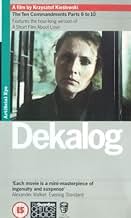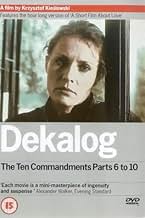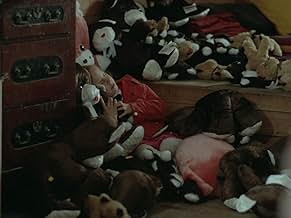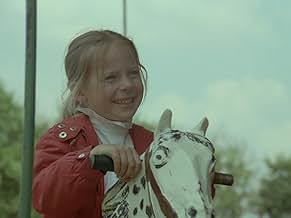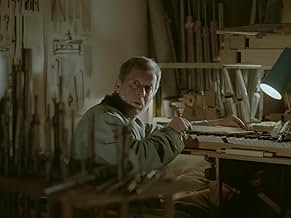Dekalog, siedem
- Episode aired Jun 15, 1990
- TV-MA
- 57m
IMDb RATING
7.8/10
4.1K
YOUR RATING
Raised as sisters, one is in fact the other's mother. Unwilling to continue living a lie, the mother tries to get her daughter back from her parents.Raised as sisters, one is in fact the other's mother. Unwilling to continue living a lie, the mother tries to get her daughter back from her parents.Raised as sisters, one is in fact the other's mother. Unwilling to continue living a lie, the mother tries to get her daughter back from her parents.
- Director
- Writers
- Stars
- Director
- Writers
- All cast & crew
- Production, box office & more at IMDbPro
Featured reviews
In Decalogue 7, some tough questions are asked by Kieslowski about parenting especially the roles played by both a father as well as a mother. This film is told through the tough life of Ania-a young girl raised by her real grand mother Ewa, who does not know that in reality Majka is her real mother. As the film develops, audiences are bombarded with tough ethical as well as moral questions. Who is the real mother to a child ? The woman who gives "biological birth" to a child or a woman who is merely better at looking after a child. These questions make a lot of sense for Ania as it is not her mother Majka but grand mother Ewa who is able to allay her fears whenever she wakes up in night due to bad dreams about wolves. Regardless of what one might say, a true woman who has borne a child would always want herself to be addressed as "Maman/Mummy/Mother". She would never appreciate her child calling her by the first name. It is due to this dilemma that Majka is compelled to take Ania with her. This twist in the story raises a simple yet highly complex question : Can one steal what belongs to one self ? The answer is simple. No, one cannot steal what belongs to oneself. One merely needs to ask about one's own belongings if they have gone into other hands. This is the ethical element which Kieslowski must have wanted to present in his film. Like in some other films made by him, Kieslowski is honest as far the portrayal of characters is concerned. In Decalogue 7, the portrayal of men is brutal, frank and honest without any embellishments as men in this short film were mere mute spectators. They are not being able to make much difference in the lives of their daughters. Lastly, what makes this short film a good moving experience is that the maturity level of Ania is very high compared to other girls of her age group.
Dekalog Seven isn't the strongest of the ten, but, like Dekalog Five, Kieslowski takes a fairly straightforward commandment and adds a twist to it. Sure, we may think Majka steal Ania, but, as Majka says, can you really steal something that was yours to begin with? It's an interesting question, and Kieslowski forces you to consider (And ultimately decide) who, Ewa or Majka, is really at fault for stealing Ania. But that's typical Kieslowski. To have a straightforward plot with a cut-and-dry scenario would be far too easy for him, and I've come to expect nothing less from his work. The types of questions he subtly asks the viewer are more important than any moral he could tell us because it forces us to question our own values and morals, instead of being told, and this kind of questioning is why Kieslowski and his works are so highly regarded.
The filial love pushed to the extreme is the main point of one of the most despairing episodes of the whole series. Painted in soft tones of a warm color photography "Dekalog 7", a sorrowful appeal against the theft of maternal affections, a touching scream of desperation against every form of domestic psychological abuse, describes the emotional journey of lonely souls towards a past immersed in voids of time and memory, thwarted by walls of self-referential egoism and full of wrong choices due to scarce sense of consciousness.
Lawful and unlawful mothers deprived of filial affection. Human beings wandering through the fury of winds of despair whose smell they can scent over and over again. An innocent child at the mercy of acts of adult selfishness destined to affect the course of human events. These are the main points of this collective drama of existence full of regression periods in infancy, clear admonishment in favor of a quiet and sensible mother-daughter relationship.
The director follows the story development most closely, avoiding to keep the events at a distance as if they were no concern of him, showing on the contrary a clear sensitiveness towards this anomalous drama of two mothers fighting over the possession of the same daughter driven passively from pillar to post. The seventh commandment, "Thou shalt not steal", must be intended in this case as the explication of a dangerous crime: the theft of a child both by her grandmother and by her real mother; the most blamable one depends on our points of view. In my opinion, for instance, to claim the right of someone else's maternity is the most reprehensible action because it does violence to the nature itself, bereaving the human being of his most precious treasure, fruit of a mutual choice of love. As usual, Kieslovski shows his complete respect of the par condicio: he finds both the fictitious mother and the real one guilty: the first one for having taken possession of someone else's motherhood; the second one for having stolen her real child. According to divine law (and to him) a theft is always a theft, and in this tormented quarrel between grown-up persons heedless of the potential damages suffered by a delicate childish psyche, will the ingenuous spontaneity of a child succeed in breaking the wall of incomprehension and hostility between kinsmen?
Lawful and unlawful mothers deprived of filial affection. Human beings wandering through the fury of winds of despair whose smell they can scent over and over again. An innocent child at the mercy of acts of adult selfishness destined to affect the course of human events. These are the main points of this collective drama of existence full of regression periods in infancy, clear admonishment in favor of a quiet and sensible mother-daughter relationship.
The director follows the story development most closely, avoiding to keep the events at a distance as if they were no concern of him, showing on the contrary a clear sensitiveness towards this anomalous drama of two mothers fighting over the possession of the same daughter driven passively from pillar to post. The seventh commandment, "Thou shalt not steal", must be intended in this case as the explication of a dangerous crime: the theft of a child both by her grandmother and by her real mother; the most blamable one depends on our points of view. In my opinion, for instance, to claim the right of someone else's maternity is the most reprehensible action because it does violence to the nature itself, bereaving the human being of his most precious treasure, fruit of a mutual choice of love. As usual, Kieslovski shows his complete respect of the par condicio: he finds both the fictitious mother and the real one guilty: the first one for having taken possession of someone else's motherhood; the second one for having stolen her real child. According to divine law (and to him) a theft is always a theft, and in this tormented quarrel between grown-up persons heedless of the potential damages suffered by a delicate childish psyche, will the ingenuous spontaneity of a child succeed in breaking the wall of incomprehension and hostility between kinsmen?
'Dekalog' is a towering achievement and a televisual masterpiece that puts many feature films to shame, also pulling off a concept of great ambition brilliantly. Although a big admirer of Krzysztof Kieślowski (a gifted director taken from us too early), and who has yet to be disappointed by him, to me 'Dekalog' and 'Three Colours: Red' sees him at his best.
All of 'Dekalog's' episodes have so many great things, and it is an example of none of the lesser episodes being bad. This is testament to the high quality of 'Dekalog' as an overall whole and how brilliant the best episodes are. Episode 7 may not be as good as Episodes 1, 4, 5 and 6, being not quite as eventful or quite as rich thematically, but is still terrific stuff.
Every single one of 'Dekalog's' episodes are exceptionally well made. The production values in Episode 7 are as ever atmosphere-enhancing, beautiful and haunting to look at and fascinating. Many of the images are impossible to forget and enhance the poignant atmosphere. The direction is quietly unobtrusive, intelligently paced and never too heavy, and the music is suitably intricate.
The themes and ideals are used to full potential, and the characters and their relationships and conflicts feel so real and emotionally resonant without being heavy-handed. Despite being based around one of the ten commandments, don't let that put you off, resemblance to religion is relatively scant.
It is not as rich in story as a few of the previous episodes, but the atmosphere is both harrowing and heart-rending, Episode 7 definitely being one of the most poignant 'Dekalog' episodes. The character development and interactions really fascinate and compelling in their realism. The acting is superb as to be expected, with complexity and nuances by the bucket-load.
Concluding this review, not one of the best 'Dekalog' episodes but still terrific. 9/10 Bethany Cox
All of 'Dekalog's' episodes have so many great things, and it is an example of none of the lesser episodes being bad. This is testament to the high quality of 'Dekalog' as an overall whole and how brilliant the best episodes are. Episode 7 may not be as good as Episodes 1, 4, 5 and 6, being not quite as eventful or quite as rich thematically, but is still terrific stuff.
Every single one of 'Dekalog's' episodes are exceptionally well made. The production values in Episode 7 are as ever atmosphere-enhancing, beautiful and haunting to look at and fascinating. Many of the images are impossible to forget and enhance the poignant atmosphere. The direction is quietly unobtrusive, intelligently paced and never too heavy, and the music is suitably intricate.
The themes and ideals are used to full potential, and the characters and their relationships and conflicts feel so real and emotionally resonant without being heavy-handed. Despite being based around one of the ten commandments, don't let that put you off, resemblance to religion is relatively scant.
It is not as rich in story as a few of the previous episodes, but the atmosphere is both harrowing and heart-rending, Episode 7 definitely being one of the most poignant 'Dekalog' episodes. The character development and interactions really fascinate and compelling in their realism. The acting is superb as to be expected, with complexity and nuances by the bucket-load.
Concluding this review, not one of the best 'Dekalog' episodes but still terrific. 9/10 Bethany Cox
The template for Dekalog is that we enter a life with its anxieties (a dying husband on a hospital bed, a husband who disappeared on Christmas Eve) and at some point the narrative surface gives way and reveals a more fluid, more interdepentent life of suffering beneath.
This is evident here in a child sister abducted (after a theatric performance no less, after the swirl of fiction) and by next morning she has become a daughter. We explore a bit more but it never amounts to more than drama about the choices we have to make.
The Kieslowski I like, as I am discovering with these Dekalog viewings, is that way he has of visually slipping ahead and back. This is on the more typical end of the spectrum, all about moral anxiety and doublebinds. The ending is both emotional and convenient, poured on as syrup instead of laid out as vision.
This is evident here in a child sister abducted (after a theatric performance no less, after the swirl of fiction) and by next morning she has become a daughter. We explore a bit more but it never amounts to more than drama about the choices we have to make.
The Kieslowski I like, as I am discovering with these Dekalog viewings, is that way he has of visually slipping ahead and back. This is on the more typical end of the spectrum, all about moral anxiety and doublebinds. The ending is both emotional and convenient, poured on as syrup instead of laid out as vision.
Did you know
- TriviaArtur Barcis, who plays a recurring role in most episodes of Dekalog, was meant to play a man at the railway station, but did not appear in this episode due to technical difficulties.
- ConnectionsReferenced in The Simpsons: Lisa's First Word (1992)
Details
Contribute to this page
Suggest an edit or add missing content


